THE JOURNAL FOR DISTINGUISHED LANGUAGE STUDIES
The Journal for Distinguished Language Studies (JDLS) was founded by the Coalition of Distinguished Language Centers under the direction of Dr. Betty Lou Leaver and Boris Shekhtman in 2002,
The JDLS is a refereed volume and the only journal to focus exclusively on the highest levels of language achievement, that is, native-like or near-native. This level is labeled Distinguished by the American Council on the Teaching of Foreign Languages (ACTFL), Level 4/Advanced Professional Proficiency by the Interagency Language Roundtable (ILR), and also Level 4 as part of the Standardized Agreement (STANAG) 6001 of NATO’s Bureau of International Language Co-ordination (BILC). Descriptions can be found at the ACTFL, ILR, and BILC websites.
The purpose of the JDLS is to create a robust international movement to promote and support language learning to the near-native level of proficiency. Contributions are sought in the areas of theory, research (quantitative, qualitative, case studies, action research), and applications. The journal typically has published a balance of articles in all three categories. Published papers develop theory, share applications that work (based on the experience of those who teach that level), and report on the research conducted and/or needed for proper evaluation and assessment of theory and application.
Articles are particularly welcomed in the following areas:
- current status of Level 4 proficiency research in each of the four skill areas;
- teaching methods to/at/above Level 4 proficiency in each of the four skill areas;
- the role of culture in achieving Level 4 proficiency in each of the four skill areas; and
- assessment to/at/above Level 4 proficiency in each of the four skill areas.
Editors
- Editor, Yalun Zhou, Ph.D., Rensselaer Polytechnic Institute, New York, USA
contact: zhouy12@rpi.edu - Associate Editor, Donna Bain Butler, Ph.D., Delaware State University, Delaware, USA
contact: dbutler@desu.edu
Advisory Board
- Dr. Rajai Al-Khanji, University of Jordan
- Dr. Christine Campbell, Defense Language Institute Foreign Language Center (Emeritus)
- Dr. Andrew Corin, Defense Language Institute Foreign Language Center (Emeritus)
- Dr. Rebecca Oxford, University of Alabama at Birmingham
- Dr. Karin Ryding, Georgetown University (Emerita)
- Dr. Nelleke Van Deusen-Scholle, Yale University (Emerita)
ISSN1547-7819.
Contents of JDLS Issues
All issues of the JDLS (2003-2011) are shelved at the Library of Congress. All current and back issues are available from the MSI Press webstore. Some back issues are also still in inventory at Amazon and Barnes and Noble online. Current issues may be found in local public and university libraries.
We are moving toward e-publication in addition to print publication. We are also working to make the journal contents more accessible. Abstracts, book reviews (accessibility) coming soon), and sample articles (one per issue) can be downloaded from this webpage gratis. Other articles (accessibility coming soon) can be downloaded from our webstore for $5 per article via link from the Table of Contents document; we are currently working on that mechanism, so please check back with us later or contact editor@msipress.com for assistance.
Volume 1.
Volume 2.
Volume 3.
Volume 4.
Volume 5.
Volume 6. 2010.
Table of Contents
Abstracts in English.
Personal Experience: “Learning and Re-Learning French” by Betty Lou Leaver, Defense Language Institute
Feature Article: “Mnemonics for Teaching Future Reference in English from Etymological Considerations” by Douglas J. Wulf, University of Washington
Feature Article: “A Generic Template for Designing Level 3-4 Courses in Sociocultural and Sociolinguistic Competence” by Boris Shekhtman, Specialized Language Training Center & Coalition for Distinguished Language Centers
Feature Article: “A Suggestion for English Instruction to International Students Working toward Level 3/Level 4 Proficiency for Their Academic Endeavors” by Yalun Zhou & Michael Wei, University of Missouri
Feature Article: “What Works in Teaching Superior-Level Students” Boris Shekhtman, Coalition of Distinguished Language Centers (CDLC) & CDLC Staff
Volume 7. 2011-2020.
Table of Contents
Abstracts in Arabic.(available only online; they are not in the print journal)
Abstracts in English.
Personal Experience: “How I Achieved Near-Native Fluency in Russian by William Hopkins, US Government Interpreter
Feature Article: “Glancing Backward, Looking Forward: The History of the ‘Level 4 Movement’ and the Journal for Distinguished Language Proficiency” by Betty Lou Leaver, Defense Language Institute
Take a Peek (sample article/free download): Feature Article: “Rethinking the Rating Process: Solution to the Threshold Performance Dilemma” by Mary Jo DiBiase-Lubrano, Yale University & Jana Vasilj-Begovic, Department of National Defence-Canada
Feature Article: “Reconceptualizing Language Programs to Achieve Level” 4 by Christine Campbell, Defense Language Institute
Feature Article: “To Superior and Beyond: Developing Professional-Level Proficiency in a Fourth-Year Russian Program” by Tony Brown, Brigham Young University, Jennifer Bown, Brigham Young University, Katya Jordan, Brigham Young University, & Elizaveta Kurganova, Russian Presidential Academy of National Economy and Public Administration
Feature Article: “The Challenge of the Inverted Pyramid” by Andrew Corin, Defense Language Institute
Volume 8. 2021-2022
Table of Contents
Abstracts in Chinese
Abstracts in English
Abstracts in French
Abstracts in German
Abstracts in Russian
Abstracts in Spanish
Take-a-Peek (sample article/free download): Front Matter and Personal Story: “How I Attained ‘Near-Native’ Proficiency in Chinese” by Cornelius Kubler, Williams College
Feature Article: “Beyond the Language: Debating as High-Intensity Cultural Engagement & Leadership” by Emilie Cleret, French War College
Feature Article: “Helping Learners Achieve the Distinguished Level of Proficiency” by James Bernhardt, Foreign Service Institute
Feature Article: “Roadmaps to Distinguished Language Proficiency” by Jack Franke, Defense Language Institute
Feature Article: “On the Cusp: Zone of Proximal Development Tables to Guide Formative Assessment” by Betty Lou Leaver, Defense Language Institute
Feature Article: “Protocol-Based Formative Assessment: Evolution and Revolution at the Defense Language Institute” by Andrew Corin & Sergey Entis, Defense Language Institute
JDLS Volume 8 Press Release – please feel free to distribute
Friends of Distinguished Language Proficiency
In conjunction with the JDLS, the Coalition of Distinguished Language Centers awarded a Friend of Distinguished Language Proficiency plaque to an individual or individuals who had contributed significantly to the advancement of learning and teaching to near-native levels of language proficiency. That practice has been continued by MSI Press LLC.
Awardees 2003-2022
- 2003. Ambassador Ruth Davis
- 2004. Dr. Dan Davidson & Dr. Maria Lekic
- 2005. HRH Prince Firas bin Ra’ed of Jordan & Renee Meyer
- 2006. Dr. Richard Brecht
- 2007. Ambassador James Collins
- 2008. Kevin Gormley
- 2009. Dina Kupchanka
- 2010. Boris Shekhtman & Dr. Betty Lou Leaver
- 2011-2020. Dr. Ray Clifford & Dr. Madeline Ehrman
- 2021-2022. Dr. Christine Campbell & Dr. David Wilmsen
Nominations for 2023-2024 are currently open. Please submit the name of the nominee along with a short justification to editor@msipress.com no later than September 15, 2024.
Submissions
To submit an article to the next issue, Volume 9, 2023-2024, download the current call for papers: CALL FOR PAPERS.
To submit a review of a book about near-native levels of language learning, please follow the JDLS Book Review Guidelines_2021, which reflect the Linguist List guidelines, and submit to the associate editor of the JDLS, Dr. Donna Butler, with a cc to the editor, Dr. Yalun Zhou, or to editor@msipress.com. If you have written or published a book on a topic related to the JDLS and would like to have it reviewed, please contact editor@msipress.com for guidance.
Submissions should represent original work. They should not have been previously published elsewhere nor be currently submitted to another journal or collected volume.

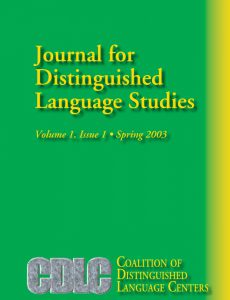
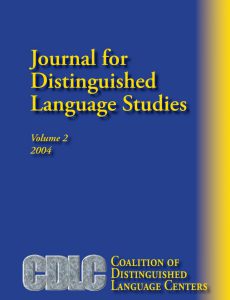
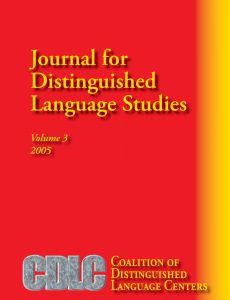
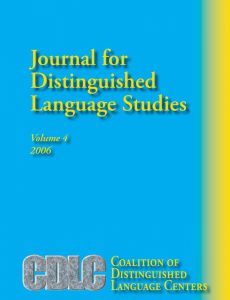
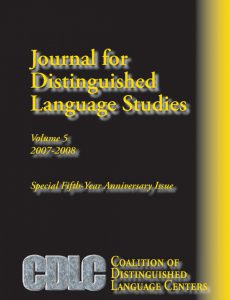
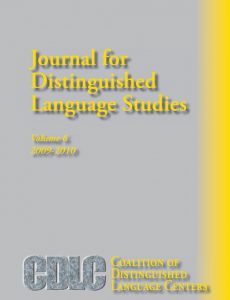
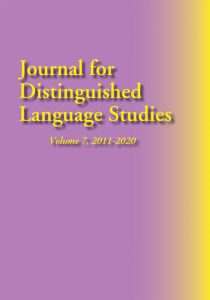
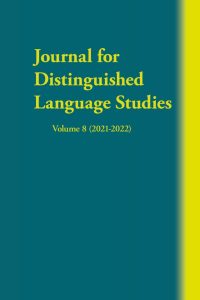
Follow Us!